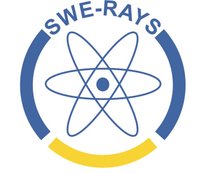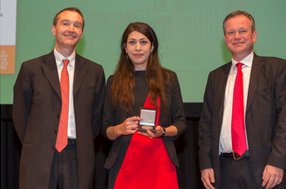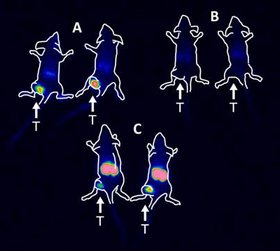SWE-RAYS
Swedish Radiation Research Association for Young Scientists
Member interview with MSc. Hadis Honarvar from Uppsala University, who was recently awarded the Marie Curie award for best presentation at the EANM'15 conference in Hamburg 10th to 14th of October
Can you give us a short overview of your background?
After I finished my bachelor studies in Radiology Technology in 2008, I started working as
a mammography technician to screen Single Parent Women for breast cancer in Iran.
One year later, I applied for Master Studies in Sweden and devoted most of my
time to studying English. While working as a mammography technician and besides
studying English I took part in some Marketing courses, which always have been of my
interest. I started my Master studies in Medical Nuclide Techniques at Uppsala University
in autumn 2010.
I finalized my MSc thesis with a topic about optimization of radiolabeling chemistry of
Affibody molecules for imaging purposes of cancer. Immediately after my master studies,
I started my PhD studies in Optimization of Radiolabeling Chemistry of Affibody molecules
for Imaging and Therapy of Cancer in Prof. Vladimir Tolmachev’s group at Uppsala
University in 2012. However, I did not work only with Affibody molecules but also short peptides. I am going to defend my thesis which describes the optimization of Affibody molecules as tracers for imaging and therapy of cancer in May 2016.
You recently received the Marie Curie award at the EANM conference in Hamburg. Can you tell us more about it?
I was granted the Marie Curie award, which is the most prestigious award in the field of
Nuclear Medicine, at the EANM (European Association of Nuclear Medicine) Congress
in October 2015. The EANM congress is considered as the biggest organization of
nuclear medicine in Europe with about 5000 participants. The EANM aims at advancing
science and education in nuclear medicine for the benefit of public health as well as at
promoting and coordinating, throughout Europe and beyond. From the abstracts
submitted for the EANM Congress, the 20 with the highest ratings were selected. Three
members of the Scientific Committee (one nuclear medicine M.D., one physicist who is
working in Nuclear Medicine, and one member with special expertise in
radiopharmacy/ radiochemistry) are nominated as a subcommittee by the chairman of the
Scientific Committee. This subcommittee has the task of classifying the submitted papers
according to their scientific and experimental value and to listen to the relevant
oral presentation. On the last day of the EANM Congress the decision concerning
the allocation of the Award was made by this subcommittee to be granted to my abstract.
The amount of the Award is € 5.000,-. And I also received a diploma and a beautiful medal.
I cannot describe my feelings in words. But I can say, when I heard my name, it was a
great relief and answer to all my hard work over the last 4 years.
As a PhD student, did you have any other senior mentors besides your supervisor? Did you do any internship?
Prof. Vladimir Tolmachev is my main supervisor, who has been supervising, teaching and supporting me in my entire PhD journey. He stands behind all achievements in my PhD studies. I have 3 co-supervisors too; Prof. Amelie Erikson Karlstrom; I would not have been able to win the Marie Curie Award without her help and also with the help of her research fellow Kristina Westerlund. Prof. Anna Orlva, who has always been supporting me by both giving advises and helping, when doing my projects. Assoc Prof. Karl Andersson also has always been supportive in all the aspects of my research.
Yes. I did a 3-week internship in Paul Scherrer Institute (a multi-disciplinary research centre for the natural sciences and technology) in Zurich, Switzerland during September 2015.
Where do you see yourself in 10 years?
I see myself a successful person who has reached all her goals and still keeps going. I am working in a job that I help it to grow and expand professionally and at the same time I grow personally and professionally with it. The last but not the least, in 10 years, I am still ambitious, developing my skills, taking on interesting projects, and working with people I can really learn from.
What advice would you give to someone just starting their PhD thesis work?
First of all, welcome to the research world. PhD studies are a big challenge for most students. The PhD road can be frustrating and exhausting at times, but I believe that the final result (your dissertation) is a major achievement in life, and a very rewarding event.
When you start your PhD education, remember to put great goals in front of you, and try to reach them. This will give you more motivation and ambition. Take leadership of your projects, and come up with new ideas. Don't depend too much on your supervisor; make sure you know what to do when they are unavailable, in order to be able to push your projects forward. However, if you want to enjoy your 4-5 years of PhD education, do not limit your life to your lab, your bed and the library. Whenever you feel like you keep on working on the same problem in the lab again and again with no results, just give it a pause. Remember, a fresh mind will take you to the solution much faster. You have the freedom to determine how much time you really want to put into your work. It's not a linear process, at all - and it's different for every student. Depending on the amount of your freedom, try to plan your time in a way to let yourself to experience the joy of the research too.
I would also recommend you to try to pick up a hobby that absorbs your mind fully, so that sometimes you can concentrate on something completely different than your research.
If you have the possibility, get out of your institution and learn from the rest of the world. An internship will give you extra power and knowledge. It will help you a lot to understand your capabilities and weak points. Conferences have been my eye-openers, the place where I found opportunities within the research community on my topic.
EANM president Arthuro Chiti and Congress Chair Wim Oyen hand over the Marie Curie medal to Hadis Honarvar
Gamma-camera imaging of HER2 expression in SKOV-3 xenografts using radiolabeled 111In-HP2 and 111In-DOTA-ZHER2:K58 Affibody molecules.
Member in focus: MSc. Hadis Honarvar
Is there a problem with the homepage? Please contact our webmaster


